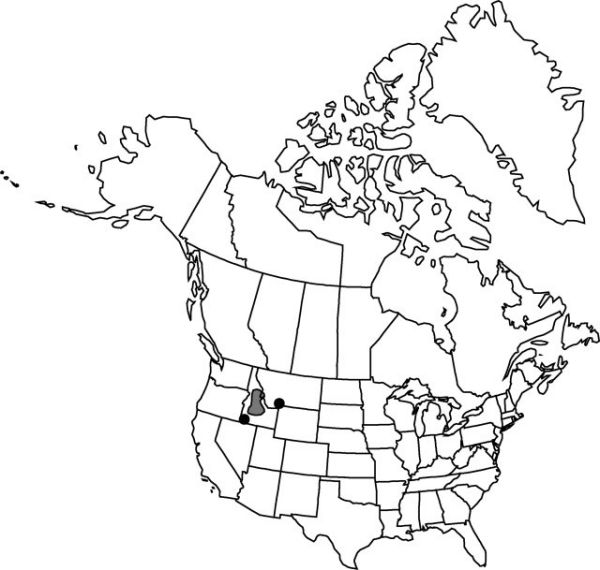Allium simillimum
Bull. Torrey Bot. Club 27: 355. 1900.
Bulbs usually solitary, not clustered on stout, primary rhizome, ovoid, 0.8–1.6 × 0.6–1.4 cm; outer coats enclosing single bulb, brownish, membranous, with ± obscure reticulations, cells isodiametric to transversely elongate, often contorted, without fibers; inner coats white to pink, cells obscure, quadrate. Leaves usually dedicuous with scape, green at anthesis, 2, basally sheathing, sheaths not extended much above soil surface; blade solid, flat to ± terete, linear, broadly channeled, 4–22 cm × 1–2 mm, margins entire. Scape usually forming abcission layer and deciduous with leaves after seeds mature, frequently breaking at this level after pressing, solitary, erect, solid, slightly flattened, very narrowly winged or not, 1–5 cm × 0.5–2 mm. Umbel persistent, erect, compact, 5–15-flowered, hemispheric, bulbils unknown; spathe bracts persistent, 2, 6–9-veined, ovate, ± equal, apex obtuse or acute. Flowers campanulate, 5–9 mm; tepals erect, white with green or reddish midribs or rarely pink, oblong to lanceolate, ± equal, becoming papery in fruit, margins obscurely to distinctly denticulate-serrulate, apex obtuse to acuminate; stamens included; anthers purple or mottled purple and white; pollen white or gray; ovary crested; processes 3, low, rounded, margins entire; style linear, equaling stamens; stigma capitate, scarcely thickened, unlobed; pedicel 2–5 mm. Seed coat dull or shining; cells smooth. 2n = 14.
Phenology: Flowering Apr–Jun.
Habitat: Coarse, sandy soils of granitic, calcareous, or basaltic origins
Elevation: 1800–3400 m
Distribution

Idaho, Mont.
Discussion
Selected References
None.
